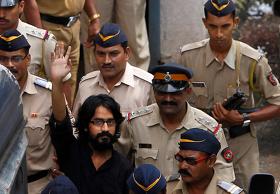
Mumbai, September 12: Aseem Trivedi, the cartoonist jailed on charges of sedition, has left a Mumbai jail. He emerged waving his fist in the air, wearing a button-down black shirt just like when he was taken into custody on Saturday. He was granted bail last evening by the Bombay High Court.
Mr Trivedi headed first to a shrine for BR Ambedkar, down the road from the Arthur Road jail. "Even Gandhi and Nehru have been charged with sedition. Were they not patriotic? We have no politics. The entire country will now fight against the law on sedition. I will cooperate in all court cases," he told reporters there. A press conference is scheduled for later in the afternoon.
The weekend arrest of the 25-year-old freelance cartoonist and anti-corruption campaigner sparked a domestic and international backlash against the government, which was accused by critics of using the colonial-era sedition law to crush dissent.
Mr Trivedi's friends say he was targeted by the government because he is a member of India Against Corruption, the movement led by activists Anna Hazare and Arvind Kejriwal. His arrest was based on a complaint filed by a lawyer who said Mr Trivedi's cartoons lampooning corruption were offensive and disrespectful of national emblems and the constitution.
Mr Trivedi had originally refused to accept bail, stating he wanted the sedition charges against him to be dropped, but his associates later said that he plans to leave jail and campaign against an archaic sedition law. The High Court will decide on September 14 whether the controversial charges should be removed. The Maharashtra government is also examining whether the removal of the charges is legally permissible.
Media rights group Reporters Without Borders was among those calling for the immediate release of Trivedi, one of whose cartoons depicted the national parliament as a huge toilet bowl. Another replaced the three lions in the national emblem with bloody-mouthed wolves to indicate a country being devoured by graft.





Comments
Add new comment